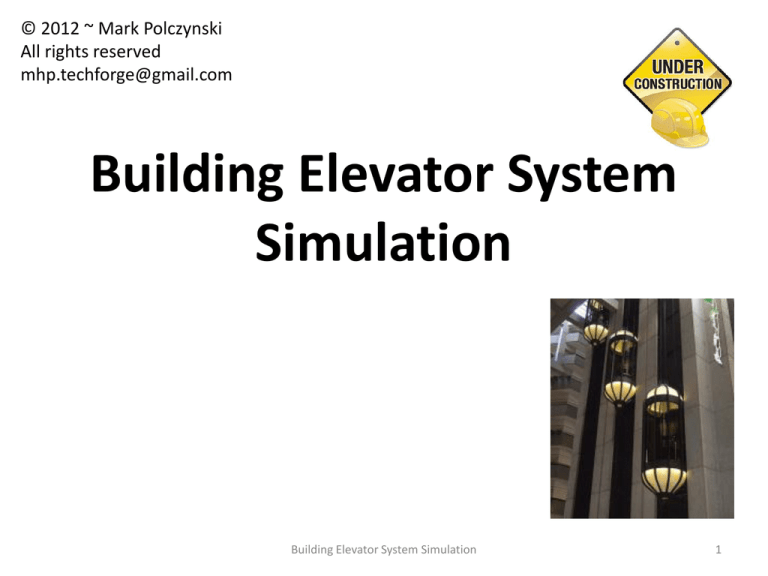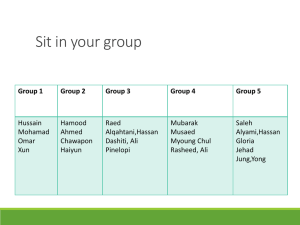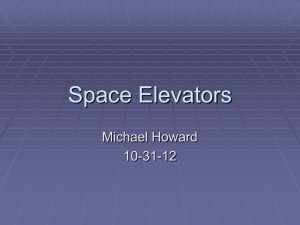
© 2012 ~ Mark Polczynski
All rights reserved
mhp.techforge@gmail.com
Building Elevator System
Simulation
Building Elevator System Simulation
1
It is assumed that you already have a basic understanding of how to:
•
Use Arena modules, resources, variable, etc.
•
Construct Arena simulation models using these elements.
The focus of this tutorial is on how models work,
not on how these model elements work.
Building Elevator System Simulation
2
Audiences:
•
Modelers interested in expanding their
modeling repertoire.
•
Elevator system designers:
•
Developing and optimizing elevator control schemes,
•
Predicting elevator system performance.
Models are capable of predicting performance measures such as:
•
Passenger waiting times,
•
Passenger traveling times.
Building Elevator System Simulation
3
What do you need before applying the models?
What you need to specify:
1. Number of floors in the building,
2. Number of elevator cars in the system.
What you need to measure or estimate:
1. Rate at which passengers enter the building
(passengers per minute).
2. Proportion of passengers that travel to various floors in
the building (e.g. 50% from Floor 1 to Floor 2,etc).
3. Time that people spend at each floor in the building.
4. Elevator car travel time.
Building Elevator System Simulation
4
Final Disclaimer
What our models simulate:
•
How elevator cars move between floors
to pick up and drop off passengers.
What our models don’t simulate:
•
How passengers enter and leave cars, e.g. opening and
closing of elevator car doors.
Building Elevator System Simulation
5
Modeling elevator system parameters – 1
•
•
•
Passenger arrival rates (minutes):
•
Customers: Exp(5)
•
Employees: Exp(1)
Time spent at floor (hours value added time):
•
Customers: Tria(.5, 1, 1.5)
•
Employees: Tria(6, 8, 10))
Car travel time (seconds transfer time):
•
(10 + 5 * (number of floors traveled – 1))
Building Elevator System Simulation
6
Modeling elevator system parameters – 2
•
Number of cars: 2
•
Number of floors : 3
•
Number of passengers:
•
•
Customers: 80
•
Employees: 40
First creation time:
•
Customers: 8:00 AM
•
Employees: 7:45 AM
•
Passenger wait time: Result (hours non value added time)
•
Replication parameters:
•
Replication length = 24 hours
•
Number of replications = 100
Building Elevator System Simulation
7
Travel between floors
Customers
To
1
2
3
Depart
From
1
10%
20%
20%
50%
2
20%
10%
20%
50%
Employees
To
1
2
3
Depart
From
1
0%
0%
0%
1000%
3
20%
20%
10%
50%
Arrive
33%
33%
33%
1%
2
0%
0%
0%
100%
Building Elevator System Simulation
3
0%
0%
0%
100%
Arrive
40%
30%
30%
0%
8
Elevator System Models
ES01: Movement of passengers only.
ES02: Movement of passengers and cars.
ES03: Cars pick up and drop off passengers.
ES04:
ES05:
Building Elevator System Simulation
9
To
1
2
3
Depart
From
1
0%
0%
0%
1000%
2
0%
0%
0%
100%
3
0%
0%
0%
100%
Arrive
40%
30%
30%
0%
Customers
Employees
To
1
2
3
Depart
From
1
10%
20%
20%
50%
Building Elevator System Simulation
2
20%
10%
20%
50%
3
20%
20%
10%
50%
Arrive
33%
33%
33%
1%
10
Customers
To
1
2
3
Depart
From
1
10%
20%
20%
50%
2
20%
10%
20%
50%
3
20%
20%
10%
50%
Arrive
33%
33%
33%
1%
Customer
initial
floor
Customer
next
floor
Employees
To
1
2
3
Depart
From
1
0%
0%
0%
1000%
2
0%
0%
0%
100%
3
0%
0%
0%
100%
Arrive
40%
30%
30%
0%
Building Elevator System Simulation
Employee
initial
floor
11
Cumulative probability that the
value will be equal to Value 1
First customer floor = DISC(Probability 1, Value 1,
Probability 2, Value 2...)
Floor number
Probability of
moving to floor
Customer Initial floor
variable array
Building Elevator System Simulation
12
Customer initial floor
First customer floor = DISC(
Customer initial floor(1,1), 1,
Customer initial floor(2,1), 2,
Customer initial floor(3,1), 3,
Customer initial floor(4,1), 0)
Departing
First employee floor = DISC(
Employee initial floor(1,1), 1,
Employee initial floor(2,1), 2,
Employee initial floor(3,1), 3,
Employee initial floor(4,1), 0)
Building Elevator System Simulation
Employee
initial
floor
13
Next customer floor = DISC(
Customer next floor(1,Current floor), 1,
Customer next floor(2,Current floor), 2,
Customer next floor(3,Current floor), 3,
Customer next floor(4,Current floor), 0)
What’s
this?
Customer
next
floor
Building Elevator System Simulation
14
Building Elevator System Simulation
15
Building Elevator System Simulation
16
Building Elevator System Simulation
17
Building Elevator System Simulation
18
Building Elevator System Simulation
19
Building Elevator System Simulation
20
Passenger
floor
selection
Building Elevator System Simulation
21
Building Elevator System Simulation
22
Next
customer
floor
Customer
visiting
time
Depart
from
building
Building Elevator System Simulation
23
Customers
To
1
2
3
Depart
From
1
10%
20%
20%
50%
Employees
2
20%
10%
20%
50%
3
20%
20%
10%
50%
Arrive
33%
33%
33%
1%
To
1
2
3
Depart
Building Elevator System Simulation
From
1
0%
0%
0%
1000%
2
0%
0%
0%
100%
3
0%
0%
0%
100%
Arrive
40%
30%
30%
0%
24






